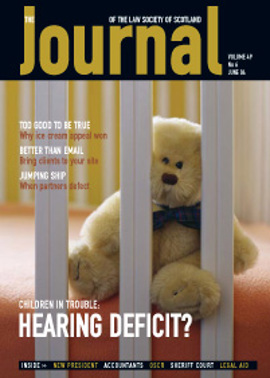EU is for opportunity
I am on a flight from Prague to Vilnius on permanent mullet watch and already marvelling at the cheapness of Eastern European liquor. Lithuania is playing host to this year’s European Young Bar Association AGM and a few of us from the Scottish Young Lawyers Association are making the journey to network [read “party”] with other likeminded lawyers and learn more about this new addition to the EU. I don’t know much about Lithuania but the guidebook tells me it is home to the world’s most dangerous nuclear reactor, their national sport is basketball and geographically it is the location of the centre of Europe. I suspect there is more to the country than this and I am not disappointed.
The changes in Lithuania over the last 20 or so years have been staggering. Since the Soviets left the country in 1991, the Lithuanians have realised their independence, re-introduced their pre-war currency and pledged their union to Europe. Accession talks commenced in 1999 and by 2003, 64% of the population were turning out to vote on EU membership. Ninety one per cent of them voted “yes” and Lithuania formally joined the EU on 1 May 2004.
The EU accession has brought about a huge amount of enthusiasm in Lithuania, perhaps more so than is the case with their Baltic neighbours. The people have known tough times in the Soviet days and they are committed to full membership of the Euro Zone, catching up with the EU 15 and increasing their competitiveness. The speed of the changes in Lithuania has shown how flexible the people are. There has been a rapid growth of e-business and investment in the development of a knowledge economy. Most importantly for foreign investors are the strong labour force, sound transport networks and the low operation costs. Lithuania also has a strategic geographic location which can act as a gateway to both the east (for Europe) and west (for Russia). So too of the country’s culture which has experience of the east but essentially belongs to the west.
I am impressed at the friendliness and openness of the young lawyers of Vilnius and surprised by their dry sense of humour. I am amazed at how hard the young lawyers work and how content they seem to be with their jobs. Those in the big commercial firms start work at 7 am and finish around 9 pm. Usually they work Saturdays too. On Sundays young lawyers are to be found in the office preparing for the week ahead so that they are not too stressed out on Monday morning. They get one month of holidays a year. They tell me it is a good life for Vilnius lawyers and those in the Lithuanian countryside are not quite so fortunate.
What EU membership means to young lawyers is greater opportunity. Continuing her legal education in another country was on one young lawyer’s agenda. But mostly the opportunity is seen as attracting foreign investment and establishing partnerships with international companies. Some of the big accountancy firms and their associated law firms already have a presence in Vilnius. Perhaps some of the big law firms will come too.
Scottish law firm Bishop and Robertson Chalmers (now Bishops) had a representative office in Vilnius between 1997 and 2001. Their aim was to win consultancy work from the EU in connection with harmonisation of Lithuanian laws with the EU and they were appointed to deliver a report to the Government of Lithuania on the steps to be taken and legal changes needed for harmonisation of their basic commercial laws – a huge project involving lawyers and management consultants from across the EU. There was also much work to be had in relation to the privatisation of the state’s assets.
If you were contemplating opening an overseas office or considering working abroad, Lithuania might not be top of your list – it probably wouldn’t even make it on the list. But the many investment incentives in the accession countries should have us thinking more about the opportunities that exist and what we, as Scottish lawyers, can contribute. As the interest grows in mergers and acquistions in the accession countries, so too will the need for lawyers on the ground to make it happen.
In this issue
- A year full of challenge
- EU is for opportunity
- Hearing a new tale
- Ice cream verbals
- Pull together
- All change
- Partners... no more
- Death by email
- Get a service
- Preparing to go
- OSCR for directing
- Education generation
- Limits of Anderson appeals
- Through a glass less darkly
- Giving within your means
- Catching all helpers
- Scottish Solicitors' Discipline Tribunal
- Book reviews
- Mining Reports Service update
- The new law of real burdens






